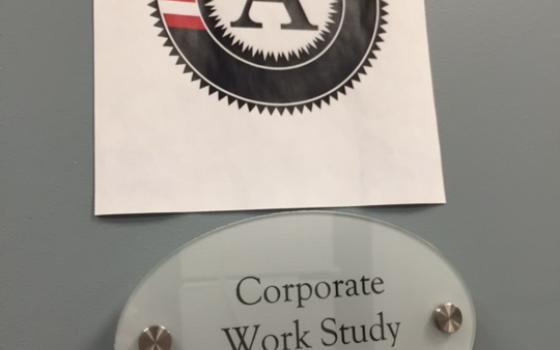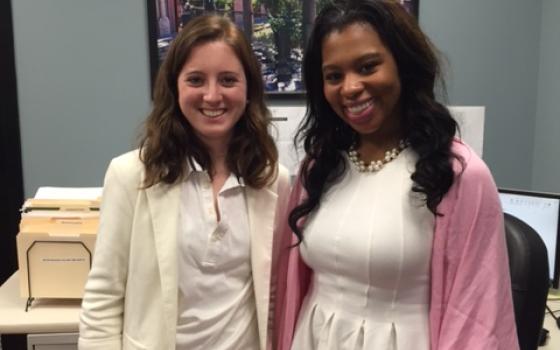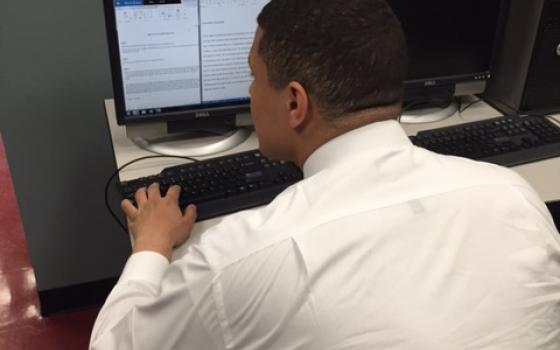Notes from the Field includes reports from young women volunteering in ministries of Catholic sisters. A partnership with Catholic Volunteer Network, the project began in the summer of 2015 This is our third round of bloggers: Brenna Neimanis is a Good Shepherd Volunteer at a juvenile justice residential detention facility serving adolescent girls in Brooklyn, N.Y., and Kerry DiNardo is a Notre Dame Mission Volunteer AmeriCorps member serving at a Cristo Rey school in Boston.
______
The cornerstone of the Cristo Rey model is the Corporate Work Study Program. Since Cristo Rey schools are private but exclusively serve students from low-income families, the Corporate Work Study Program is a way for students to earn money to cover most of their tuition.
Our Corporate Work Study Program contracts with companies that provide students with full-time entry-level positions. These jobs are at law firms, corporate businesses, hospitals and everything in between.
Four students share one job, collectively performing a 9 a.m. to 5 p.m. shift from Monday to Friday. Every class, freshman through senior, has a designated work day Tuesday through Friday, and Mondays rotate between the classes. The result is that students work five full days each month.
The Corporate Work Study Program is incorporated separately from the school itself, so it works like a temporary employment agency for Cristo Rey students. Our students have amazing relationships with their work-study placements and supervisors. Many are able to work at their placements for pay over the summer!
The school schedule has to revolve around these workdays. Three weeks out of the month, students have four class days and one work day in a week; the other week, they have three class days and two work days in a week. Because of this, our students have a longer school day and a longer school year, and they have to pack more content into fewer school days. But, as I've seen firsthand, the benefits to the students from working at their internships over their high school years are plentiful.
At Cristo Rey Boston, prior to freshman year, the incoming class participates in a two-week program called Foundations. During these two weeks, students go through full academic days with classes that help them learn the soft skills they will need to know to succeed at their work-study placements. It is during these two weeks that the work-study team and teachers/staff of Cristo Rey Boston are able to see what work-applicable skills the students have. They are able to assess what kind of work-study placement each of the students will be successful in while also seeing what still needs to be taught.
Once a week throughout freshmen year, students have work-study class, where they continue to learn skills that will help them in the workplace, such as resume-building, Excel, typing, and so much more.
Just a few weeks ago, I had the pleasure of participating in Teacher-to-Work Month. Each March, the Corporate Work Study Program schedules visits for the faculty/staff at Cristo Rey Boston to visit students at their work placements all over Boston. It is a critical event that helps us adults understand what the students experience in their learning that takes place outside of the school. I know the ins and outs of what happens at school every day, but once students leave school for work once or twice a week, all I know is that my students are out there working in the real world. I hear stories about their supervisors and the tasks they perform, but it's a completely different experience to see them in action.
For the past two years, I was able to visit the same student during Teacher-to-Work Month. When I visited last year, it was an eye-opening experience. I must admit I was pretty nervous. I'm used to dealing with teenagers all day, and though I had been a business major in college and had a few internships in the corporate world, I was anxious to see what this environment would be like, especially through a teenager's eyes.
I took the train downtown and made my way through a crowd of men and women in suits leaving to get lunch. As my high school student gave me a tour of his high-rise building, complete with a beautiful view, the Corporate Work Study Program's effect truly clicked for me. Not only are students getting academically prepared for college and beyond, but they're getting the real-world training that will help them thrive in their futures. Students are learning to make eye contact while shaking hands, to work on a team, and so many other things that will help them succeed in the workplace.
This year, that student has a new placement in Natick, Massachusetts. He is tasked with important research that involves tracking fraudulent use of products. He is included in meetings with executives in the company and is treated like a full-time employee. It is the confidence that the company places in him to conduct meaningful work that, in turn, allows him to believe more in himself and his abilities and gives him tangible experience to succeed in the future and see himself in the workplace. He is networking with some great contacts, which will help him with not only the rest of his high school career, but also his college years and beyond.
To be able to put on your resume that you had a four-year internship as a high schooler is valuable. Our students are learning about professionalism and what it takes to succeed at the workplace, so they are leaps and bounds ahead of their peers at other schools.
While in the school, students are prone to act as teenagers do when they are surrounded by other teenagers who encourage this behavior. But, as I'm reminded by my visits to my student's work-study placements, they are mature beyond belief. Seeing things through my student's eyes also deepened our relationship and allowed me to better empathize with him and the other students.
[Kerry DiNardo is a Notre Dame Mission Volunteer AmeriCorps member in her second year of service at Cristo Rey Boston High School, where she works in the Student Life Office.]



